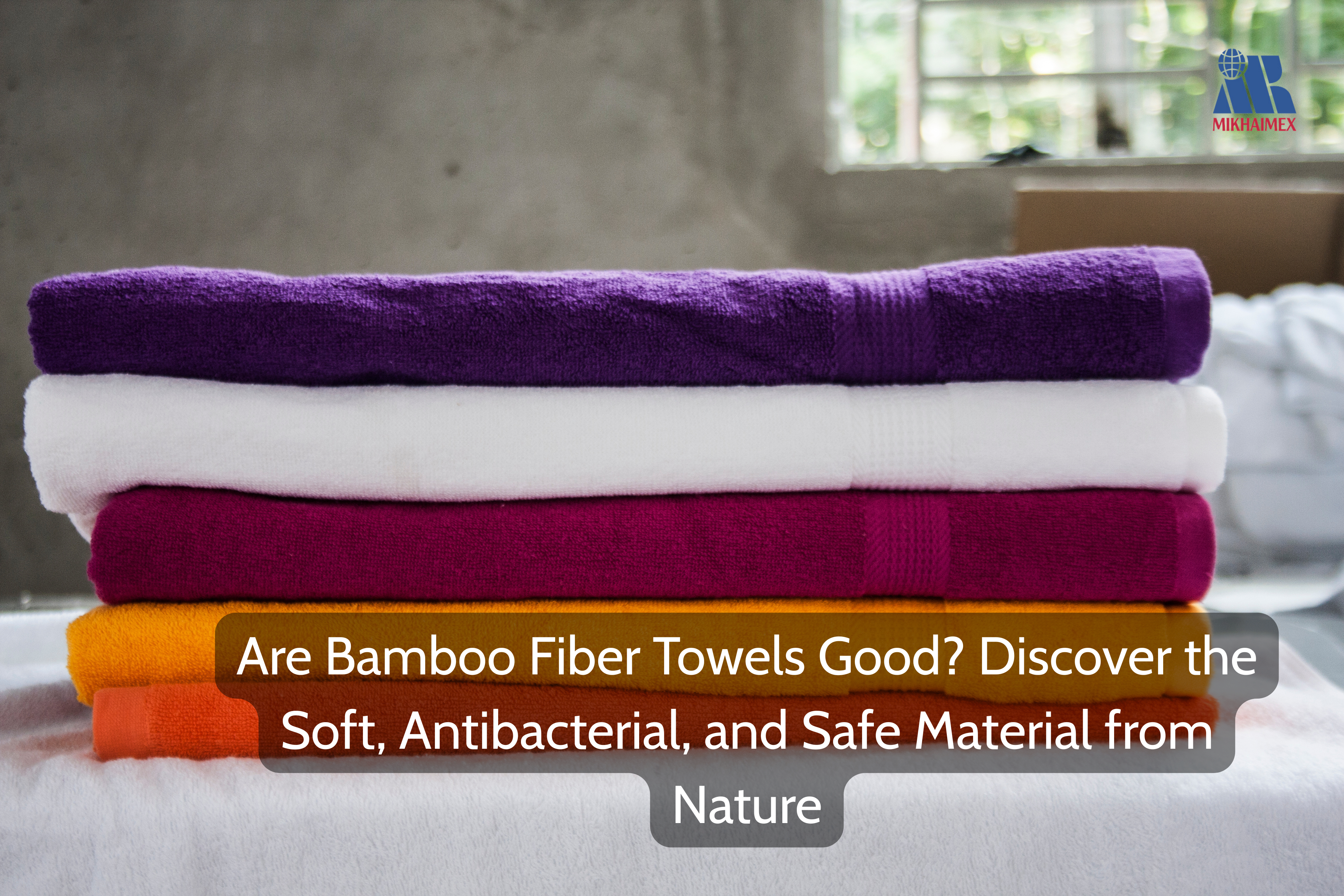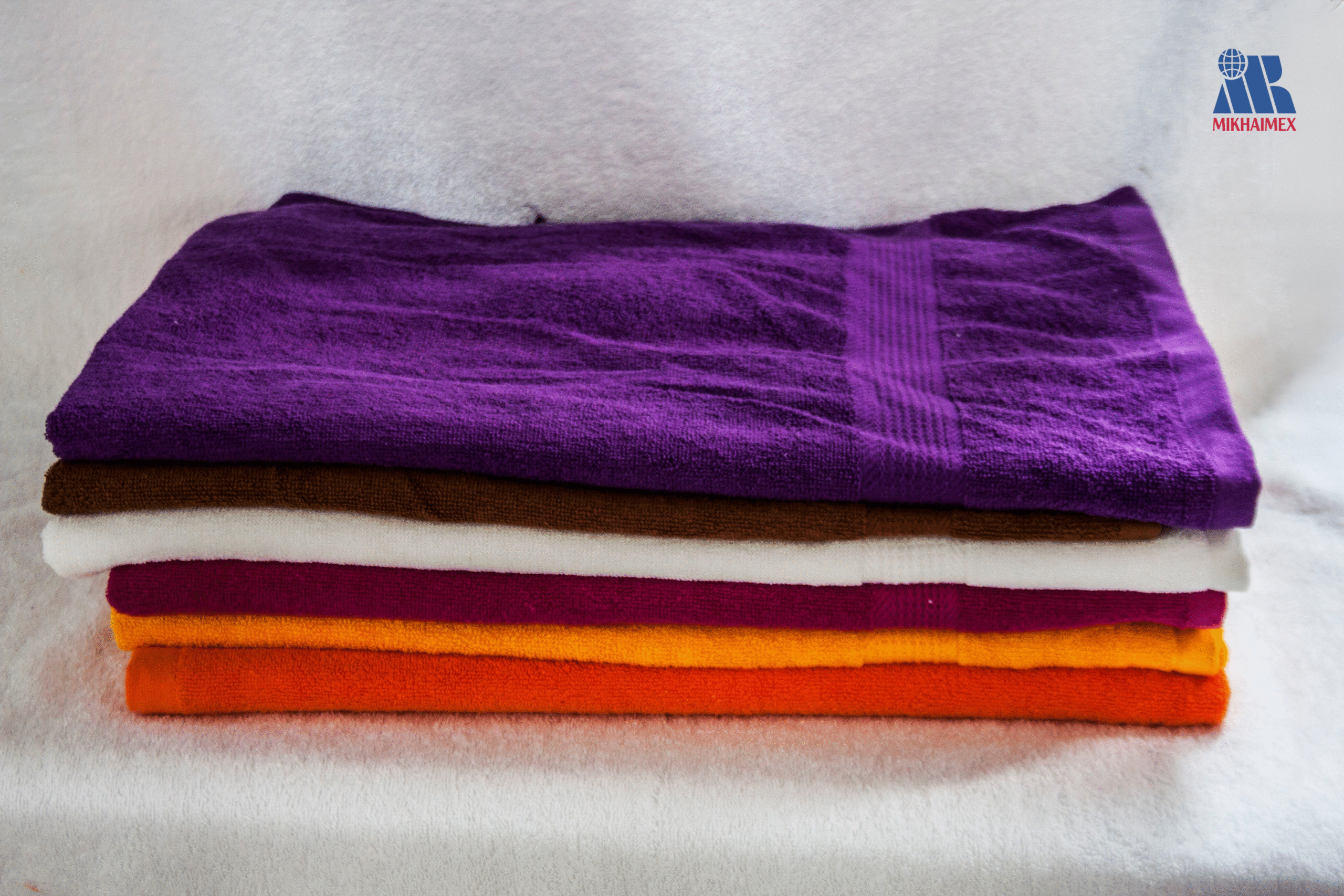Are Bamboo Fiber Towels Good? Discover the Soft, Antibacterial, and Safe Material from Nature
1. Introduction to Bamboo Fiber Towels – The Trend of Natural Materials in Modern Textile Manufacturing

In recent years, as the concepts of “green fashion” and “sustainable materials” have become central to global consumer trends, bamboo fiber towels have emerged as an ideal choice that balances natural origin, functional performance, and environmental consciousness.
Bamboo fiber towels is not merely a daily product but also the result of advanced textile technology combined with sustainable production thinking. Its main raw material is extracted from the bamboo plant — a species that grows rapidly, regenerates naturally, and has a high capacity to absorb CO₂. For this reason, bamboo fibers have been increasingly used in the high-end textile industry, especially for personal care products such as face towels, bath towels, baby towels, and spa linens.
From a materials science perspective, bamboo fiber is created through mechanical or chemical processing that extracts cellulose from bamboo stalks before being spun into fine filaments. When blended with natural cotton, the two fibers complement each other perfectly: bamboo adds softness, antibacterial ability, and superior moisture absorption, while cotton provides durability, structure, and a familiar touch. This combination creates bamboo fiber towels – products that harmonize functionality, health, and aesthetics.
2. What Is a Bamboo Fiber Towel? Structure, Production Process, and Natural Antibacterial Mechanism
2.1. Definition and Fiber Structure
Essentially, bamboo fiber is a type of regenerated viscose derived from the natural cellulose of bamboo. The production process begins with crushing bamboo stalks, removing lignin, processing cellulose, and spinning it into fibers. When blended with cotton, the ratio usually ranges from 30% to 70% bamboo fiber depending on the desired characteristics of the final fabric.
The structure of bamboo fibers is hollow and porous, allowing better air permeability and moisture absorption than pure cotton. Moreover, bamboo cellulose naturally contains a bioactive compound known as “Bamboo Kun”, which plays a vital role in providing the fiber’s unique antibacterial and deodorizing properties.
2.2. Natural Antibacterial Mechanism
“Bamboo Kun” is a naturally occurring antimicrobial substance found in bamboo tissue. It can inhibit the growth of bacteria, mold, and odor-causing microorganisms. Even after the fiber-spinning process, part of this compound remains active, helping bamboo fiber towels retain stable antibacterial performance for long periods, even after repeated washing.
Studies conducted by textile research institutes in China and Japan have shown that bamboo fibers can reduce the growth of Staphylococcus aureus and E. coli by 70–80% compared to ordinary cotton. This explains why bamboo fiber towels are particularly suitable for sensitive skin, babies, and users in humid environments.
2.3. Standardized Production Process of Bamboo Fiber Towels
The manufacturing process of bamboo fiber towels typically combines biological and chemical treatments within a closed-loop system, ensuring both safety and environmental friendliness.
First, raw bamboo is sourced from certified organic plantations without pesticides or chemical fertilizers. After harvesting, the stalks are crushed into fine powder, and lignin and hemicellulose are removed to isolate pure cellulose — the structural component used for spinning. Modern factories no longer use toxic solvents such as carbon disulfide but instead apply biodegradable, reusable solvents, significantly reducing wastewater and emissions.
The extracted cellulose is dissolved and spun into bamboo viscose fibers, a semi-natural material known for its softness, smoothness, and strong absorbency. In the spinning stage, bamboo viscose is often blended with cotton in specific ratios to leverage the best properties of both: the smooth, antibacterial, and breathable qualities of bamboo with the durability and elasticity of cotton.
The weaving stage is performed on specialized terry weaving machines, forming thick, absorbent loops characteristic of towels. During finishing, manufacturers often apply bio-polishing or bio-scouring — enzymatic processes that remove impurities, improve softness and brightness, and minimize pilling. Whitening and softening steps avoid chlorine and fluorescent agents, using gentle oxygen-based bleaching to ensure safety for the skin and preserve fiber integrity.
Before distribution, bamboo fiber towels undergo rigorous quality tests for tensile strength, absorbency, colorfastness, and antibacterial activity. Only products meeting both performance and biocompatibility standards are certified for export. This closed-loop manufacturing method minimizes waste and energy consumption while producing towels that are consistently soft, antibacterial, and eco-friendly — reflecting the philosophy of sustainable production in the modern textile industry.
3. Superior Advantages of Bamboo Fiber Towels Over Traditional Cotton Towels
Bamboo fiber towels represent a major advancement in textile innovation thanks to their combination of comfort, aesthetics, and ecological value. Compared with conventional cotton towels, this new-generation product shows outstanding advantages in multiple aspects, from texture and performance to environmental impact.
The first impression most users note is the natural softness and smooth touch. Bamboo fibers are fine, round, and even in texture, minimizing friction and irritation on the skin. When blended with cotton, the towel surface becomes silkier and smoother, offering a cool and refreshing sensation — especially ideal for sensitive skin, babies, or those with dermatological conditions. Tests show that bamboo-blended towels are 20–30% smoother than pure cotton, maintaining a “silky touch” even after many washes.
Next comes the superior absorbency and breathability. The natural capillary structure inside bamboo fibers absorbs and disperses moisture quickly, enabling the towel to absorb water up to 1.5–2 times faster than ordinary cotton. At the same time, it dries more quickly, reducing unpleasant odors and dampness — a valuable feature in tropical climates like Vietnam’s.
A hallmark feature of bamboo fiber towels is their natural antibacterial and deodorizing property. Containing “Bamboo Kun,” a natural bio-agent that resists bacterial growth, the towels remain hygienic and odor-free without chemical treatment. This makes them ideal for bathrooms, spas, gyms, and other humid environments.
Despite their softness, bamboo fiber towels maintain excellent durability and shape stability. Bamboo’s tensile strength ensures the fabric resists fraying or stretching, while cotton blending enhances mechanical stability. Even after dozens of washes, the towels retain color vibrancy and shape, making them particularly suitable for hotels, spas, and professional settings that require longevity and appearance retention.
Finally, bamboo fiber towels stand out for being eco-friendly and safe for users. Bamboo grows rapidly without fertilizers or pesticides and can regenerate naturally within a few years. Modern bamboo processing follows a closed-loop recycling model, reclaiming up to 99% of solvents and minimizing environmental emissions. The final product contains no chlorine, fluorescent agents, or harmful chemicals, ensuring complete safety for children and people with sensitive skin.
By combining these exceptional traits — softness, absorbency, antibacterial resistance, durability, and environmental responsibility — bamboo fiber towels have become a symbol of the sustainable lifestyle movement, representing harmony between modern technology and nature.
4. Applications of Bamboo Fiber Towels in Everyday Life
Thanks to their softness, antibacterial property, and moisture absorption, bamboo fiber towels are widely used across various sectors:
-
Face and bath towels: offering comfort and freshness after use.
-
Baby towels: gentle, hypoallergenic, and mold-resistant.
-
Spa and hotel towels: ensuring hygiene and luxury feel.
-
Sports towels: quick-drying and odor-resistant.
-
Travel or gift towels: compact, elegant, and durable.
With growing consumer awareness of eco-friendly living, bamboo fiber towels have become more than a daily necessity — they embody a conscious, refined lifestyle aligned with sustainability values.
5. Minh Khai Textile – A Pioneer in Bamboo Fiber Towel Manufacturing in Vietnam

In the context of a global shift toward sustainable development, Minh Khai Textile Company has emerged as one of Vietnam’s pioneering enterprises in applying modern technology to the production of Bamboo fiber towels that meet international standards. With more than half a century of establishment and growth, Minh Khai is not only a brand deeply rooted in Vietnam’s textile tradition but also a symbol of innovation, integration, and adaptability to the green trends of the new era.
Equipped with advanced weaving, dyeing, and finishing lines imported from leading textile technology nations such as Japan and Germany, Minh Khai ensures strict quality control at every production stage — from the selection of organic bamboo fibers, spinning and weaving, to the finishing and packaging processes. Each bamboo fiber towel leaving the factory undergoes rigorous testing in accordance with Oeko-Tex Standard 100, certifying that it contains no harmful chemicals and is completely safe for users, especially for children and those with sensitive skin.
Beyond technological advancement, Minh Khai steadfastly pursues a sustainable development strategy as the cornerstone of its long-term growth. The company has invested in a closed-loop water treatment system to minimize wastewater during the dyeing process and is gradually transitioning toward renewable energy in its production operations. In parallel, Minh Khai implements eco-friendly packaging solutions by reducing plastic materials and promoting the use of recycled resources — an important step toward building a “green factory” aligned with international standards.
Over the past 50 years, Minh Khai has steadily affirmed its brand position through high-quality bamboo fiber towel collections that are soft, colorfast, durable, and meet the export standards of demanding international markets. Each product is not only a result of advanced technology and meticulous craftsmanship but also reflects the creativity, responsibility, and national pride of Vietnamese textile artisans. Minh Khai has become a representative model of the harmonious combination between traditional value and continuous innovation, contributing to elevating the reputation of Vietnamese textiles on the regional map.
From the perspective of material science and sustainable consumption, bamboo fiber towels embody the perfect balance between nature and technology — soft, antibacterial, absorbent, and environmentally friendly. Through consistent investment in technology, quality, and green management, Minh Khai Textile Company not only raises the standard of Vietnamese towels but also reinforces its commitment to clean production and sustainable development — contributing to a safer, more responsible, and eco-conscious future of consumption.


